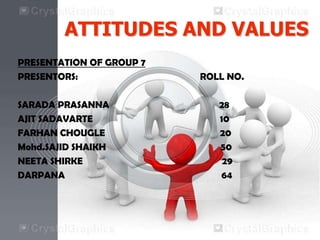
Attitudes and values
- 1. ATTITUDES AND VALUES PRESENTATION OF GROUP 7 PRESENTORS: ROLL NO. SARADA PRASANNA 28 AJIT SADAVARTE 10 FARHAN CHOUGLE 20 Mohd.SAJID SHAIKH 50 NEETA SHIRKE 29 DARPANA 64
- 2. WHAT IS ATTITUDE?? • Attitude is view point, a mind-set or a way of valuing life. • Evaluative statements of objects, people or events. • A collection of feelings. • Multiple experiences which leads to beliefs. • Beliefs cluster together to form values (that which you value). • Values of life shape itself, into a world view called ATTITUDE.
- 4. Continued……………. • COGNITIVE: The value component (eg. killing is wrong) • AFFECTIVE: An emotional component (eg. I am angry at the terrorists) • BEHAVIORAL:The action component, the intent to act in a certain way (eg. Give blood, prayer vigil) ATTITUDE refers to the AFFECTIVE component. Some more examples: • I feel good about my job. • I don’t think women do a very good job around here.
- 5. TYPES OF ATTITUDES:- • Theoretical Attitudes: Solving a problem. Discover of truth and knowledge • Utilitarian Attitudes: Return on an investment of time, energy or money. Discover utility and what is useful or practical. • Aesthetic Attitudes: Discover experiences, impressions and expressions. Subjective experiences of self and other.
- 6. Continued…………….. • Social Attitudes: To eliminate hate and conflict. Focus on how our ideas can help others to achieve their potential. • Individualistic Attitudes: To assert yourself and have your causes be victorious. How presentation will increase power. Advancement of person’s position or company position. • Traditional Attitudes: To search for a system for living. Focus on the meaning and totality of life. Living consistently according to their “BOOK”
- 7. FUNCTIONS OF ATTITUDES: • Knowledge:- Organize and simply people’s experience. • Instrumental:- Maximize rewards or minimize punishment. • Ego-Defensive:- Protect ourselves from unpleasant realities. • Value Expressive:- Allow the expression of personal values and self-concept.
- 8. WHAT IS VALUES?? • Values carry an individual’s concept of right and wrong. • Principles that guide our lives. They are designed to lead us to our ideal world. • Values define what is of worth, what is beneficial and what is harmful. • Values are standards to guide our action, judgement and attitudes.
- 10. TYPES OF VALUES: • Moral • Material • Aesthetic • Intrinsic • Extrinsic • Universal/American • Group specific values
- 11. FUNCTIONS OF VALUES • Terminal set of values:-a list of desirable end states. A Comfortable Life. • Instrumental set of values:-the modes of behaviour to achieve terminal values. Ambition
- 12. Cont.………… Differences in values system within organisations can product conflict and management problems. Immaturity: One who has not identified his values. Immaturity Maturity Unclear Values Clear Values Drifters Life of purpose Flighty Meaning and Direction Uncertain Apathetic
- 13. VALUES VS FACTS VALUES FACTS Values are things we feel “should”, “ought”, or “are supposed to” influence our lives. Facts simply state what actually are. It is easy to confuse values with facts. VALUE: All people should be active in a specific religion. FACT: Many people are active in a specific religion. VALUE: The best time to buy clothing is when the price is discounted. FACT: The most economical time to buy clothing is when the seasons change and the price is reduced. A value is a statement of one’s personal beliefs FACT: A fact is established by observation and measurement.
- 14. WORK RELATED ATTITUDES • Attitudes affect the way you do your job and how you relate to others. • I don’t think women do a very good job around here • Cognitive component-women are inferior(value judgement) • Affective component • Behaviour-discriminate against women in firm • Job satisfaction • What do I think about working here • Job Involvement • Linking job with self-worth • Organisational Commitment • Do I Identify with the organisation and its goal • Companies with a focus on the success of each individual employee outperform companies who have more of task orientation. If an individual is matched to the appropriate career, success should follow.
- 15. ATTITUDES AND VALUES ATTITUDES ARE MUCH LESS STABLE THAN VALUES
- 16. CONSISTENCY OF ATTITUDES:- • Attitudes change to fit circumstances. • Cognitive Dissonance Theory • Self Perception Theory • Individual will attempt to reduce or eliminate differences between attitudes or between attitude and behaviour and thus discomfort if.
- 17. Reduce Dissonance • Differences is important • They have some control in the reduction • The rewards of dissonance isn’t too great • Social pressure to confirm isn’t too great • Differences isn’t reinforced by personal experiences Self-perception • If your attitudes are well established, you will use them to guide your behaviour • If your attitudes are not well established, you will infer your attitudes from the prior behaviour.
- 18. • “IF YOU STAND FOR NOTHING, YOU FALL FOR ANYTHING” • “IT’S NOT DOING THINGS RIGHT, BUT DOING THE RIGHT THINGS”
- 19. Thank you
